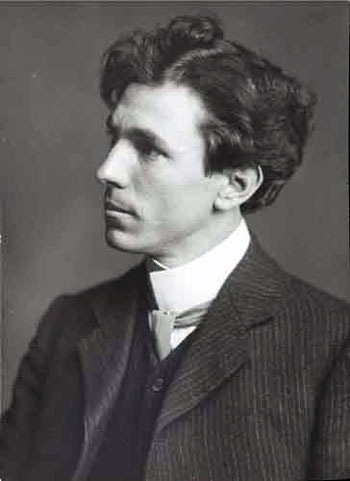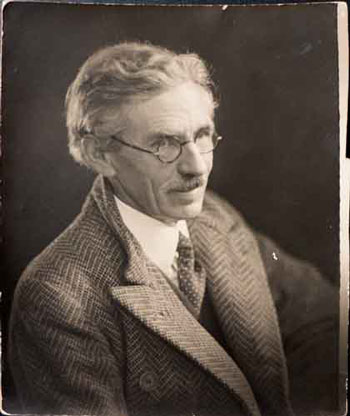Harold Cazneaux
Biography
Harold
Pierce Cazneaux was born in New Zealand, where his Australian parents
operated a photographic studio. The family returned
to Australia
in 1886 and his father, Pierce Mott Cazneau (sic), worked in Duryea
Studios in Melbourne and later Hammer & Co in Adelaide. Harold
began his working life at age seventeen as an artist-retoucher at
Hammers studio.
Cazneaux
also studied art at night at the School of Design in Adelaide but
was not interested in photographic art until
seeing the work
of John Kauffmann and early pictorialists at the annual exhibition
of
the South Australian Photographic Society between 1898 and 1903.
In
1904 Cazneaux moved to Sydney to take a better position at Freeman’s
studio, first as an artist-retoucher but later as the chief camera
operator. Once in Sydney, Cazneaux was able to begin his own
photography with his first camera, a Midge Box camera, which he
used to take
pictures while travelling to and from work.
He met other amateurs
and was introduced
by one of these, Norman Deck, to the Photographic Society of
New South Wales in 1907. |
|
 |
By
1909 Cazneaux was sufficiently established to mount a one-man
show at the society’s rooms. If not the first such show,
Cazneaux’s
exhibition was probably the first to establish the idea of
the photographer-artist, as it was well received by artists
and press.
Cazneaux gained a reputation
for the spontaneity of his outdoor shots. “The Razzle
Dazzle” attracted
considerable attention at the London Salon. H. Snowden Ward
reviewed the show for the Photograms of the Year (1911, p.
288) and praised
Cazneaux for outstanding work.
At
his one-man exhibition Cazneaux made the acquaintance of Sydney Ore
Smith. who later, in 1920,
appointed him official
photographer
to The Home magazine. This was just at the time when Cazneaux
was attempting to establish himself as a freelance photographer.
He
had resigned from
Freeman’s after suffering a nervous breakdown in 1918.
Studios such as Freeman’s were still very Victorian
in the clichéd
studio portraits they turned out and the sweatshop conditions
under which the staff worked. For Cazneaux, who was interested
in photography
and preferred to work outdoors, the situation became impossible.
He felt unable to leave as he had married in 1905 and by
1918 had a large
family to support. Cazneaux first worked independently from
Cecil Bostock’s
studio in Denman Chambers, Phillip Street, but from 1920
he worked from his home in Roseville, Sydney.
Assignments
for The Home provided scope and stimulus beyond
the range of the work shown at pictorial salons. The Home
was a promoter
of
modernism and Leon Cellert, in particular, encouraged Cazneaux’s
experimentation.
 |
|
From
the late 1920s, Cazneaux’s work
shows a remarkable welding of the romantic atmosphere
of pictorialism with the dramatic forms,
angles and lighting which were part of the vogue for
modernism in art. Cazneaux’s industrial pictures and Flinder’s
Ranges landscapes of the 1930s have a monumental scale
quite uncharacteristic of any
other Australian pictorialist.
In
1938 Cazneaux also exhibited with the Contemporary Camera Groupe
but became increasingly disheartened
by
the modern
trends in photography,
which he felt were cold and mechanistic. They seemed
involved with novelty and not the universal beauty
the pictorialists
sought.
Cazneaux
continued working until his death in 1953. In 1952 he was honoured
with a national tribute evening
and earlier,
in
1938, had
received an Honorary Fellowship of the Royal Photographic
Society.
Cazneaux’s pictures were extensively
published in Sydney Ure Smith publications, as well
as the Australian Photo-Review and Harrington’s
Photographic Journal magazines and in the British
annual Photograms of the Year. |
Return to Harold Cazneaux main introduction page
(above text based on Gael Newton's Silver & Grey biography of Cazneaux)

